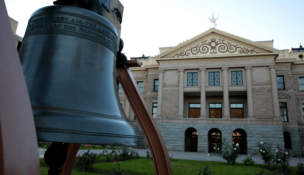Group folds effort to raise minimum wage
Howard Fischer, Capitol Media Services//August 9, 2024//[read_meter]
Group folds effort to raise minimum wage
Howard Fischer, Capitol Media Services//August 9, 2024//[read_meter]
Arizonans won’t get a chance to vote in November to raise the state minimum wage.
One Fair Wage, the sponsoring group of what would have been Proposition 212, said Thursday it is withdrawing the signatures submitted in July to put the measure on the ballot. Instead, it will most immediately focus on electing sympathetic candidates to the Legislature.
The longer-term goal, however, is to approach the issue not on a statewide basis but instead by trying to get individual counties, cities and towns to adopt their own minimum wage at a level that is higher than what is now required by state law.
The decision, though, was not entirely voluntary.
Raise the Wage Arizona, the local operation of One Fair Wage, submitted 354,278 signatures.
But the Arizona Restaurant Association, in a lawsuit filed in Maricopa County Superior Court, contends there are a series of problems.
For example, state law requires that anyone who is a paid circulator or from out of state must first register with the Secretary of State’s Office. Attorney Kory Langhofer told Judge Scott Blaney many of those who collected signatures did not comply.
Langhofer also contends there are other violations of state laws regulating petition circulators. And if circulators were acting illegally, all the signatures they collected cannot be counted.
All total, he said that once those invalid signatures are eliminated, the petition drive no longer has the legally required 255,949 names.
A hearing had been set for next week. Now, with the withdrawal, that is no longer necessary.
Saru Jayaraman, president of One Fair Wage, said it is possible the measure still could have survived the legal challenge. But she admitted that was not a sure thing.
“We didn’t want to just keep spending money on that when the chances were getting harder and harder, given the process,” Jayaraman said. “That’s why we decided to pivot to legislation and local initiatives.”
More immediately, what she also wants to do is focus on killing Proposition 138.
That measure, put on the ballot by the Republican-controlled Legislature at the behest of the Arizona Restaurant Association, would allow its members to pay its tipped workers 25% less than the minimum wage as long as what they make, with tips, is at least $2 an hour above the minimum wage. The current tip credit is $3 an hour.
There is no question but that change would financially benefit the restaurants.
In the case of the current $14.35 minimum, the tip credit can reduce the restaurant’s cost to $11.35 an hour. But bumping that up to 25% would drop that to $10.76.
But the focus, beyond defeating Proposition 138, is trying to do on a community-by-community basis what Proposition 212 would have done statewide: Hike the minimum wage.
That local option is allowed under versions of changes to the state minimum wage laws previously approved by voters.
Voters in Tucson and Flagstaff already have enacted their own minimum wage ordinances. Jayaraman says she believes residents of other communities would be amenable to the idea.
Arizona had no minimum wage before 2006, with employers required to pay only what the federal government required – $5.15 an hour at that time.
That year, over the objections of restaurants and some other businesses, voters approved creation of the state’s first minimum by a margin of 2-1. That hiked it immediately to $6.75 with a mandate to make annual changes to account for inflation, adjustments that brought it to $8.05 an hour in 2016.
A new successful initiative at that time, approved by 58% of those who voted, brought it immediately to $10 in 2017 and automatically to $12 by 2020. Subsequent inflation adjustments now have it at $14.35.
By contrast, the federal minimum remains at $7.25.
Proposition 212 would have added a dollar an hour to the state minimum this coming January, with another dollar at the beginning of 2026, all on top of the regularly scheduled inflation hikes.
But what particularly alarmed the Restaurant Association was that the initiative would have phased out the tip credit. That would have forced employers to pay at least the minimum wage, regardless of how much the workers made in tips.
Now Prop 212 and that risk are gone. But Steve Chucri, president of the Arizona Restaurant Association, said the effort to get voters to approve Prop 138 and its 25% tip credit will continue.
He said that a larger tip credit does not mean workers would take home less. Chucri pointed out that restaurants could claim the credit and reduce their own costs only if an employee actually made $2 an hour over the minimum when tips were included.
“This isn’t saving big corporate giants like they’re suggesting,” he said. “This is the mom-and-pops who need this tip credit to keep people employed and to keep their restaurants operating.”
And while the restaurants lost the minimum wage ballot battles in 2006 and 2016, Chucri said he believes the results will be different this time and voters will approve the increased tip credit in Prop 138.
“What we are seeing and what people and our guests are understanding is that it’s getting more and more expensive to dine out,” he said.
But State Rep. Mariana Sandoval, who has been working with One Fair Wage, said in a written statement there is no reason to have a tip credit at all.
“We should not feel obligated or the social pressure to tip because we know folks are not making a living wage,” said the Goodyear Democrats. “And we should definitely not be subsidizing anyone’s payroll.”
Chucri also argued that efforts to increase wages at the ballot and get rid of the tip credit are being pushed by “outside interests” and not restaurant employees who he said “get paid very well.”
“And if they didn’t, they wouldn’t be staying at these restaurants for decades,” he said.
And what of the $14.35 minimum wage that can be paid to workers who don’t get tips?
Chucri said that, at least in the fast-food industry, that is a starting wage. And he said that most have to pay more just to get and keep workers.
“They’re letting the market dictate that,” Chucri said.
The future of Proposition 138 aside, that still leaves One Fair Wage with the local option.
On one level, the same hurdle remains: Putting a measure on a ballot requires valid signatures which generally need to equal 15% of those who voted in the last local election. But Jayaraman said that focusing the resources on just a few communities at the time versus a statewide contest could prove more effective, saying it could take as few as 1,000 signatures in some cities to qualify for the ballot.
That local option is already playing out in Glendale where a group known as Worker Power has submitted enough signatures to raise the minimum wage for hotel and event center workers to $20 an hour. The same measure has other provisions, including how many rooms attendants can clean in an eight-hour workday before their pay is doubled.

















